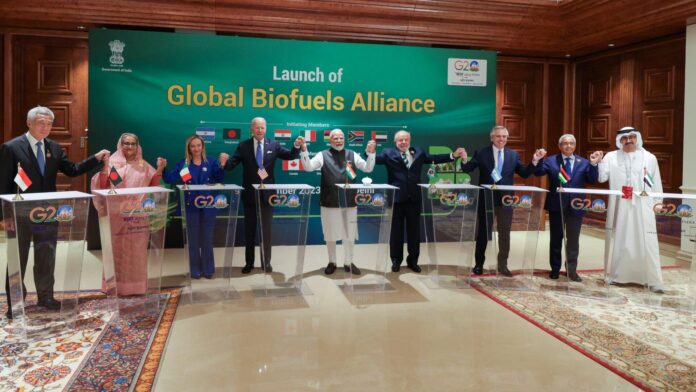
Written By Shaina Ganapathy, Head – Community Outreach, Embassy Group
As the world confronts a mounting climate crisis, nations are being urged to reimagine their energy mix, not just for environmental security but for long-term socio-economic resilience. With India set to carry forward its leadership as the G20 Chair, the Global Biofuels Alliance (GBA) announced at the 2023 G20 Summit in New Delhi has reignited interest in biofuels as a key pillar of sustainable energy.
The formation of the GBA is a milestone moment that enables countries and corporations to collaborate on technology, policy, and market mechanisms while supporting a fair and inclusive green energy transition. This article explores the key challenges, case studies, and solutions that will define the alliance’s success and its ability to shape a more sustainable global future.
Biofuels: A Strategic Lever in the Green Energy Transition:-
Biofuels derived from agricultural waste, forestry residues, and organic matter offer a renewable, lower-emission alternative to conventional fuels. India, with its vast agrarian economy, is well-positioned to lead this shift.
As per reports by the International Energy Agency (IEA), India is rapidly emerging as the world’s fastest-growing bioenergy market,with the sector projected to account for more than a third of global bioenergy demand growth between 2023 and 2030. The proposed alliance aims to standardise biofuel blends, create a common framework for trade and technology transfer, and support countries in scaling production.
For developing economies, especially in the Global South, biofuels offer an energy security cushion. They reduce dependency on volatile global oil markets while enabling nations to localise energy production along with generating employment, reducing emissions, and catalysing rural economies.
Why Biofuels Matter and What Solutions Look Like:-
Biofuels offer a scalable pathway to decarbonisation. They can be used in existing engines and infrastructure, and depending on the feedstock, can reduce greenhouse gas emissions by up to 75% over their lifecycle. Importantly, they also generate rural employment,
particularly among farming communities that contribute agricultural waste, corn, or sugarcane for fuel production.
The GBA addresses biofuel development through:–
Sustainability standardisation
Capacity-building
Research partnerships
Investment incentives
Technology transfer and feedstock security
These align with IEA’s G20 ETWG recommendations calling for long-term frameworks and synchronised global efforts. For aviation, for example, regulatory mandates such as minimum SAF blending targets will be crucial.
Unlocking Wide-Range Implications:-
Decarbonisation at Scale: Biofuels can play a critical role in decarbonising hard-to- abate sectors like transport and aviation. Blending mandates in fuels can be rapidly scaled using local feedstocks such as sugarcane, maize, agricultural waste, and used cooking oil. When managed sustainably, this contributes significantly to lowering emissions while ensuring fuel compatibility.
Energy Security and Rural Economy Boost: For countries like India, biofuels reduce dependence on imported crude oil, thereby enhancing energy sovereignty. Simultaneously, they offer economic opportunities to rural communities, particularly farmers, who can participate in biofuel value chains through biomass and crop residue supply.
Global Collaboration and Policy Alignment: The GBA provides a platform for knowledge sharing, policy coordination, and co-investment in research and infrastructure. A unified approach to feedstock certification, emissions tracking, and trade frameworks will create a trusted global ecosystem for biofuels.
India’s Role on the Global Stage
India’s leadership in forming the International Solar Alliance has already demonstrated its commitment to inclusive, south-led climate action. A similar approach for biofuels could fast-track a more just and equitable energy transition. With Brazil and the U.S. as likely
collaborators, the Global Biofuel Alliance could emerge as a significant third pillar alongside solar and hydrogen energy initiatives.
However, it’s crucial that this alliance is not just top-down.
Ground-level deployment, stakeholder engagement, and responsible sourcing must form the bedrock. CSR initiatives, with their grassroots reach and community-first approach, are uniquely placed to bridge this gap. The success of the Global Biofuel Alliance will hinge on collaborative implementation. It must transcend summits and translate into tangible programs, blending policy, private sector innovation, and people-centric CSR models.






